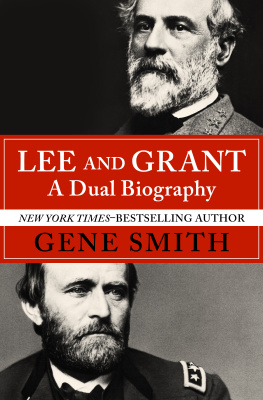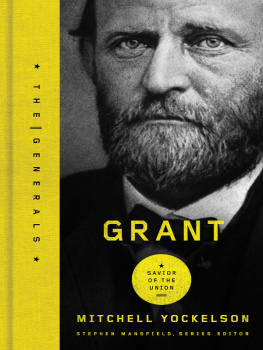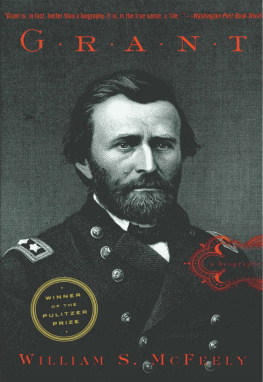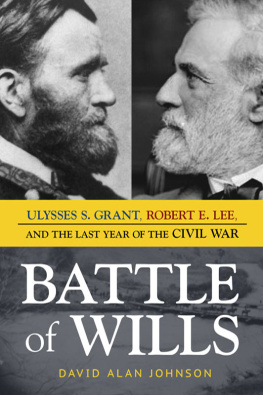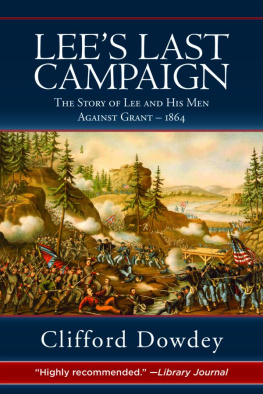
GENE SMITH
FROM OPEN ROAD MEDIA
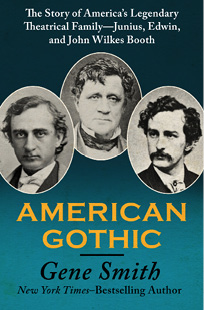
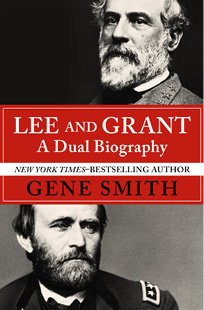
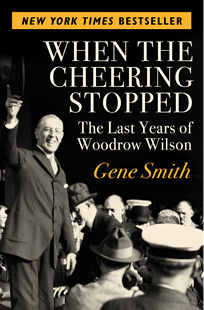


Find a full list of our authors and
titles at www.openroadmedia.com
FOLLOW US
@OpenRoadMedia




Lee and Grant
A Dual Biography
Gene Smith

Napoleon says: The personality of the general is indispensable, he is the head, he is the all of an army. The Gauls were not conquered by the Roman legions, but by Caesar. It was not before the Carthaginian soldiers that Rome was made to tremble, but before Hannibal. It was not the Macedonian phalanx which penetrated to India, but Alexander. It was not the French Army which reached the Weser and the Inn, it was Turenne. Prussia was not defended for seven years against the three most formidable European powers by Prussian soldiers, but by Frederick the Great.
To this list, as we shall see, may be added: It was not the valiant soldiers of the South who stood like a wall between Grant and Richmond, but Lee. And it was not the gallant men of the North who drove Lee from the Rapidan to Appomattox, but Grant.
Major General J.F.C. Fuller, British Army
CONTENTS
INTRODUCTION
There is a theory that the United States needed its great war of brothers to weld in a terrible fire what had been and what might be, that the end of one epoch and the birth of another could not be accomplished peacefully; that the irrepressible conflict was preordained. Across a tiny strip of land, not much more than 100 miles in length and 50 in breadth, the rise of the middle class and the modern industrial state was decided. The Industrial Revolution won. Yesterday gave way to Tomorrow. Feudal Europe transported to the New World bowed to modern America. And leading the great armies that decided the issue were two generals who almost too perfectly, almost too precisely, exemplified the meaning of the causes they served. Neither could more exactly represent the South and the North: Lee the Christian soldier, the knight-crusader of ancient lineage at the head of his legions, the image of noblesse oblige whose example reached downward to inspire the men who followed him because he was the representative of all that was best in their doomed society of polished old ways and understood relationships; Grant the great soldier of no roots whose weakness for liquor was known to the least of his followers, who had risen from nowhere, from failure and griminess and physical labor to do heroic and magical things and to hold out to those who followed him the hope that they toofarmers, laborers, craftsmen, new immigrantscould in America attain great heights, rise in the world, lead men, grow rich, grow famous, become President.
One old, one youngas were the societies they representedthey met to end their war in what has been called the finest moment in American history, so perfectly played were the parts, so generous the men in their estimate of one another, so kindly and forgiving their actions and so simple and correct the fashion in which they went about their business. It was said of Lee that he was a born king among men. No one ever said that of plain Sam Grant. It was not his stylenot him. But when their war was over the divine right of kings was no more. Grant had done away with it through his work and because of what he was. They knew it even thousands of miles from the battlefields of the War Between the States, sensed it. When Grant came among the Europeans, wearing no gilded uniform and no High Victorian sash or plumed helmet or imperial robes, hundreds of thousands, millions, were proud to cheer him. In Asia other hundreds of thousands and millions came to him. The greatest fellow-soldier of his army, Sherman, said that Grant was of all men the typical American. He called no spirits from the deep, as Lee did. He never said he wanted to, either. Yet he did what the half-dozen generals who preceded him were unable to do: He brought Lee to fight his fightGrants fightand he brought him to surrender, for all that he was, as we shall see, shy, physically unimpressive, quiet and modest. Character is the first thing, said the great military theorist Alfred von Schlieffen.
In war, said Karl von Clausewitz, everything is simple, but the simple is difficult. An interesting thought. It points to the fact that what we call military genius is far more a matter of temperament than intelligence. By its nature it cannot be tested before it is called into use. One can act the part of a great soldier while serving in junior rank and can be believed to be filled with promise, and believe it oneself, only to show and find out when given responsibility that greatness isnt there. Going to war is like opening the door to an unknown room, said Adolf Hitler, quite correctly. One never can be sure of whats in it. (You never can tell what makes a general, Grant said. Our war, and all wars, are surprises in that respect.)
As it is not dependent upon intelligence, so also is military genius not based upon technical knowledge. This is particularly true of the war with which this book largely concerns itself. All of the solders mentioned, both successes and failures, had gone to West Point. There they received the same instruction in the campaigns of Napoleon. That was about the limit of their knowledge. And during 186165 there were no secret weapons. The war was a series of duels between commanders. What is such a duel? War is more of a struggle between two human intelligences than between two masses of armed men, says the military intellectual G.F.R. Henderson, and the great general does not give his first attention to numbers, to armament, or to position. He looks beyond these. He looks at his enemy opposite number. That is where the answer to any questions he may care to ask will be found.
So it was with the pair of generals studied in this work. They were two men from backgrounds so different they could almost have lived in different countries in different centuries, yet they met in a common opposing effort and together have gone down in history. One thinks of Wellington when one thinks of Napoleon, but each did great things independent of the other, and their meeting at Waterloo was over in a matter of hours. Though it is true Montgomery looked at a portrait of Rommel every night in the desert before retiring, the two names do not come down to us linked with the same firmness. As for other duels, who but the specialist can tell us the name of von Mansteins 1940 opponent, or that of the Japanese who opposed MacArthur? Whom did Marlborough defeat at Blenheim, or von Moltke at Sadowa?

